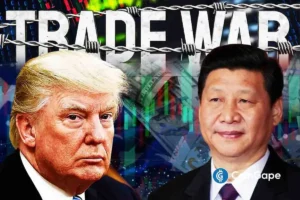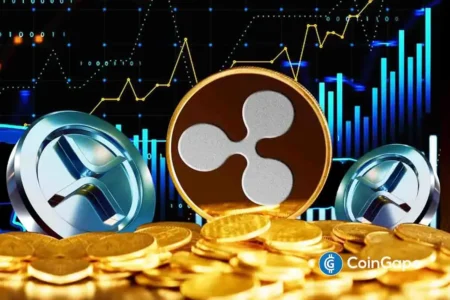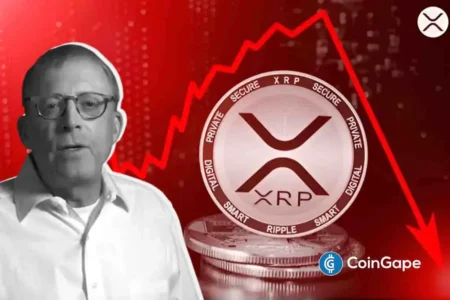The Perilous Threat: Trump’s Controversial Move Against Fed Chair Jerome Powell
Introduction: The Political Landscape and the Fed
Significant tensions have unfolded in recent months between President Donald Trump and Federal Reserve Chair Jerome Powell, particularly regarding interest rates and the broader economic policy of the United States. Amidst this backdrop, crypto entrepreneur Anthony Pompliano has vocalized his concerns over Trump’s threats to dismiss Powell. Pompliano, known for his insights into the cryptocurrency landscape as well as traditional finance, argues that such actions could threaten the independence of the Federal Reserve and set a troubling precedent for U.S. governance. This article seeks to explore Pompliano’s perspective on the situation, the implications of Trump’s threats, and the reactions from various stakeholders in the financial landscape.
Pompliano’s Stance: A Cautious Critique of Trump
In a recent video, Anthony Pompliano explicitly criticized President Trump’s intentions to potentially fire Jerome Powell. He emphasized that such a unilateral move by the President would not only be inappropriate but could destabilize the careful balance of power required to maintain the Federal Reserve’s independence. Pompliano mentioned, “The idea of firing the Fed chairman is a very bad precedent to set this way,” indicating his belief that disagreements between the executive branch and the Fed should be addressed through dialogue, not drastic actions. While he acknowledges the Fed’s faults and missteps, Pompliano’s focus remains on the broader implications of political interference in what should be an autonomous institution.
The Nuance in Criticism: Disagreement with the Fed, Disapproval of Trump’s Tactics
Interestingly, Pompliano’s critical analysis does not solely extend to President Trump but also involves his views on the Federal Reserve itself. He contends that while he recognizes the Fed’s mistakes, those errors do not validate firing its leadership as a response. “Just because somebody else is doing something wrong doesn’t mean that you should do something wrong,” he stated, illustrating the need for holding a principled stance amidst political turmoil. This perspective underscores the complexity of governance—while disagreements are natural, the methods of addressing them are critical to the maintenance of a robust democratic process.
Amid Political Tensions: The Fed’s Independence in Jeopardy?
Pompliano also touches on a significant concern regarding the Federal Reserve’s operational independence. He asserts that the Fed has become “highly politicized,” which contradicts its fundamental purpose as an independent monetary entity. The idea that the central bank should operate free from political influence is meant to instill confidence in investors and maintain market stability. Pompliano’s warnings about the Fed’s politicization serve as a cautionary note; should Trump succeed in removing Powell, the future integrity of the Fed may come into question, thus impacting investor confidence and financial markets at large.
The Wider Reaction: Voices of Concern
Concerns about Trump’s threats have surfaced from various public figures and institutions. Senator Elizabeth Warren, a prominent critic of Trump, emphasized that disrupting the independence of the Federal Reserve could erode trust in U.S. capital markets. She warned, “A big part of our economy strong, and a big part of the world economy strong, is the idea that the big pieces move independently of politics.” The opinions shared by figures such as Warren and Pompliano reflect a broader anxiety within both political and economic circles: the fear that politicizing key financial institutions may lead to volatility, creating repercussions that can be felt across the globe.
The Current Climate: Perspectives on Political Influence
Despite the alarming discussions surrounding Trump’s threat to dismiss Powell, markets have remained stable, with platforms like Polymarket reflecting only a 19% likelihood of such an event occurring. This statistic indicates that, while the rhetoric may be heated, the realization of such a drastic political maneuver may not be as imminent as some fear. However, the ongoing discourse continues, highlighting the fragile interplay between politics and economic policy. The consensus among commentators and analysts is that even the suggestion of undermining the Fed’s independence poses risks that could ultimately lead to economic instability, even if the threat does not manifest into action.
Conclusion: Upholding Integrity in Governance
The conversation ignited by Trump’s threats presents critical questions about the sanctity of institutional independence in governance. Anthony Pompliano’s warnings not only highlight the potential dangers of political encroachment on the Federal Reserve, but also reinforce the idea that healthy discourse should prevail over retaliatory actions. As both the public and stakeholders in the economy continue to engage with this topic, the calls for maintaining the integrity and independence of the Fed serve as a reminder of the need for strategic and ethical leadership in navigating the complex world of modern governance. The dialogue led by voices like Pompliano’s emphasizes the importance of protecting institutions designed to serve the public interest in the face of partisan influences.
















